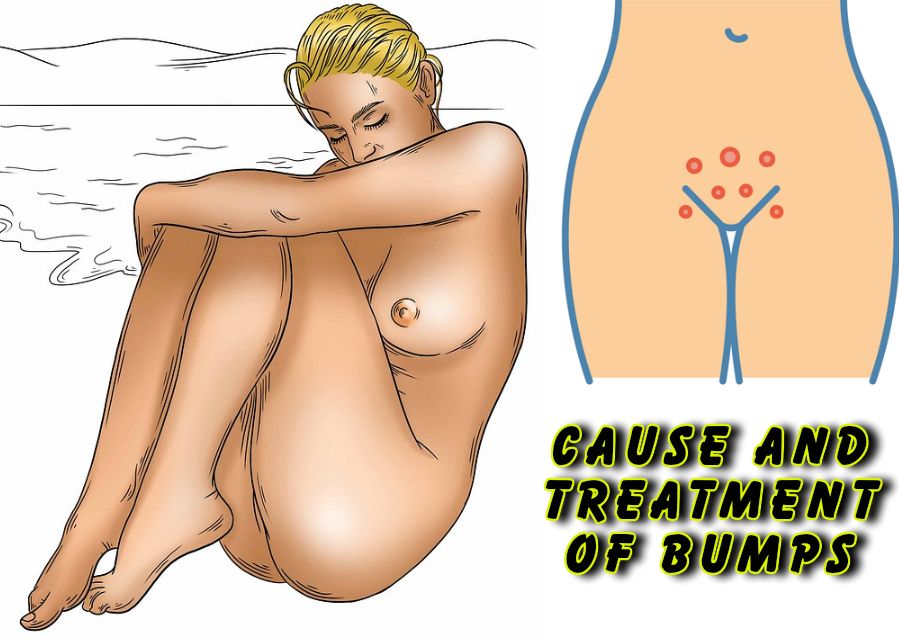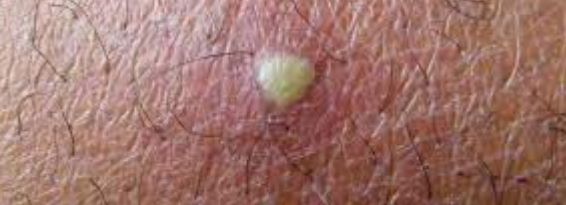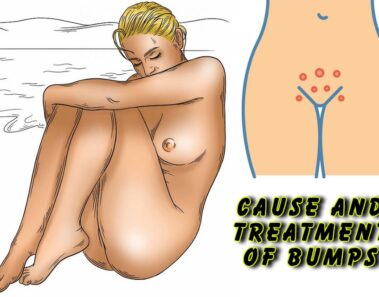Causes of Sores and Bumps on the Vagina
Sores or bumps on or around the pelvic area can be caused by a number of different conditions. These conditions include sexual assault, ingrown hairs, and cysts. Fortunately, most of these conditions are painless and generally appear similar to other sores.

STIs
While some causes of sores and bumps on or around the vagina are self-limiting and treatable, others are serious and require medical attention. It is important to know that some of these conditions can be contagious, spread to other areas of the body, and result in life-threatening complications.

While sexual contact is the most common cause of genital sores, other conditions may be the cause. In some cases, skin conditions or allergic reactions may lead to genital sores. In these cases, treatment can include using condoms and washing the affected areas regularly.
If the sores aren’t treated, they can become serious and lead to a range of complications, including pelvic inflammatory disease and scarring of the reproductive tract. Untreated STIs can also negatively affect a woman’s ability to become pregnant. As a result, it is crucial to find the source of the sores to avoid serious medical complications.
Some common causes of sores or bumps on the vagina are sexually transmitted infections (STIs). Infections of the vagina can be caused by HPV or herpes. If you’re suffering from genital herpes, you should see a doctor right away and avoid sexual activity until you’re sure you don’t have it. Herpes sores are often painful and can be difficult to notice, but there are medications that can treat herpes and reduce the symptoms of outbreaks.
Other common causes of sores or bumps on or near the vagina include using tampons, nylon, and synthetics. These products hold moisture and heat close to the skin and make it easier for an infection to start. These products also change the balance of organisms in the vagina. To avoid genital herpes, you should avoid sexual activity during outbreaks and make sure to wear latex condoms. To prevent transmission of the infection, always wash your hands after using the toilet. You should also avoid using douches, powders, sprays, and perfumes.
Other causes of sores or bumps on the vagina include infection and irritation. Symptoms can range from itching to pain. Most women don’t need to seek medical treatment for vaginal bumps, but if they’re persistent or causing discomfort, it’s important to seek medical attention right away. A healthcare professional will be happy to help.
Lichen sclerosus
Most bumps or sores on or around the vagina are harmless and will go away on their own, but there are times when you should seek medical attention. A doctor can help you determine the cause and prescribe an appropriate treatment plan. However, some sores or bumps may become infected, causing pain or discomfort. There are several causes of sores and bumps on or around the vagina.
Some of the causes of sores or bumps on or near the vagina can be herpes, an inflammatory condition, or an allergic reaction. These can be difficult to prevent, but they can be reduced by washing the affected area regularly and not shaving. While these are the most common causes, some women experience sores or bumps on or around their vagina for a variety of reasons.
Genital herpes and genital warts can cause sores or bumps on the vagina. Symptoms of these diseases can be painful and require immediate medical attention. Patients with genital herpes should avoid sexual activity until they are diagnosed and treated. Symptoms can vary from mild to severe, but treatment can manage these conditions and prevent them from becoming life-threatening.
Vaginal lesions may also be related to noninfectious conditions such as allergic reactions and contact dermatitis. However, sexually transmitted infections are responsible for a large percentage of vaginal rashes. Symptoms of vaginal lesions can include painful urination, pain during sexual intercourse, and vaginal discharge.
Other causes of sores or bumps on or near the vagina include certain types of auto-immune diseases. While rare, these disorders usually affect elderly women and teenagers, they can also occur in the vagina or in the anus. They cause sores to break the surface tissue and may ooze pus or fluid.
Another cause of sores and bumps on or around the vagina is the HPV virus. HPV infection is a known risk factor for vaginal cancer. Patients with the virus may experience itching, crusting, and a foul smell. A biopsy can help diagnose the condition. If the condition is confirmed, treatment involves removing the affected area through surgery or radiotherapy.
Molluscum contagiosum
Sores and bumps on the vagina can be caused by a variety of different causes. The most common are molluscum contagiosum, which is usually seen in children but can also affect adults, especially those with compromised immune systems. This virus causes flesh-colored bumps and lesions on the vagina and anus. Symptoms can be painful and involve scratching. Fortunately, the disease is generally curable and can be treated with oral medication or creams.
If you suspect that you may have a vaginal infection, see a doctor as soon as possible. Sexual contact can spread the infection, and it is important to avoid sexual activity during outbreaks. You can also lower your risk of transmission by using a latex condom and washing your hands often. You should also avoid shaving the areas around the vagina, which may contain the infected tissue.
Most vaginal bumps can be prevented by maintaining good hygiene. Make sure to clean the area well with warm, soapy water and change into dry clothing after touching the area. Most bumps will clear up on their own, but if they persist or show signs of infection, see a doctor for further treatment.
Genital warts and genital herpes are two of the most common causes of sores on the vagina. If you’re suffering from genital warts, it is important to avoid intercourse until your doctor has confirmed the condition. These sores can be extremely painful and may cause you to experience difficulty urination. In addition, they may cause a discharge from the vagina. Once you know which cause is causing your sores and bumps, you can begin taking medication to minimize your symptoms. These medications may also help reduce the risk of spreading the virus to others.
Some people don’t notice symptoms until the sores or bumps start to develop. However, this infection may be life-threatening if untreated. Antibiotics may treat the symptoms and even completely eliminate the infection. If the sores are oozing, you may need to seek medical attention.
Treponema pallidum
Syphilis is a sexually transmitted disease caused by the bacterium Treponema pallidum. It can be spread through oral sex without using condoms. Men who have sex with men are at a higher risk for contracting syphilis. It is estimated that 56.7% of primary syphilis cases in the US occurred in men who had sex with another man.
A number of tests can be used to diagnose syphilis. Some tests detect antibodies against the Treponema organism. Others are more specific and can determine whether a patient has syphilis. If a person is positive for one of these tests, then a physician can perform a second test to confirm the diagnosis.
The diagnosis of urethritis is usually based on a urine test or a swab from the vagina. The infection is treated with antibiotics. If left untreated, the infection can recur and cause pelvic inflammatory disease, ectopic pregnancy, or infertility.
This skin condition is highly contagious, and symptoms can develop in a few weeks. It is most often spread through sex, but it can also spread through clothes, bedding, or a person’s mouth. The rash is red or copper-colored and may be painful. The symptoms can include fever, chills, aches, and a fever.
If you suspect that you have a herpes virus, it is vital to see a doctor. During your visit, your doctor will carry out a physical exam and may collect a swab or blood from the infected area. While there are a variety of treatments for female genital sores, the most effective way to avoid getting the infection is by using barrier methods, such as condoms. These can be purchased over the counter or online.
Treatment of Sores Or Bumps on Or Around the Vagina
If you have sores or bumps on or around your vagina, you may be suffering from a STI. While there are no cures for STI-related genital sores, treatment options can help you prevent infection. If you notice a sore or bump near your vagina, you should not engage in sexual activity.
STI-related genital sores are treatable but not curable
STI-related genital sore treatment focuses on preventing the spread of the disease, and a healthcare provider can help determine whether the sore is caused by an STI. In addition to performing a physical examination, the physician may take a swab or blood sample from the sore. In addition, a healthcare provider can check the patient’s symptoms and recommend treatment options.
A doctor may prescribe antiviral medications to treat genital herpes. These can help prevent transmission of the disease to sexual partners. Antiviral medications can also help relieve the discomfort and itching caused by an outbreak. Pain relievers and cool compresses are also common treatments. Your physician may also provide advice regarding how to protect yourself from transmission to sexual partners.
When considering STI treatment, remember that a doctor isn’t trying to place blame. You may have contracted the disease from a past partner. You don’t need to be ashamed to visit a doctor for treatment. Since more than 20 million Americans develop an STI each year, it’s important to know that you’re not alone. To find a health care provider, visit your local health department. Some departments offer confidential testing and treatment.
Some STIs can cause life-threatening complications. Despite their potential for harm, treatment can reduce the severity of symptoms and reduce the risk of contracting the disease. It’s important to use a condom and limit your sexual partners.
STI-related genital sore treatment focuses on prevention. In 2016, nearly one million people acquired an STI. Many of these infections are asymptomatic, and some people may never even know they have them. The United States Department of Health and Human Services issued the first-ever STI National Strategic Plan (STI Plan) to provide a clear road map for prevention, diagnosis, and treatment.
Antibiotics are the standard treatment for many STIs, including gonorrhea, chlamydia, trichomoniasis, and syphilis. However, they’re only effective if you take them the prescribed amount of time.
Treatment options include antibiotic ointment
Treatment options for sores or bumps near the vagina include topical medications such as an antibiotic ointment and suppositories. Depending on the severity of the symptoms, a course of treatment can last from a few days to a few weeks. Some medications have side effects such as itching and burning, and you may have to avoid them if you’re pregnant.
Another option is to visit your doctor. There are several possible causes of sores or bumps on the vagina, including atopic dermatitis and vaginitis. Inflammation of the vagina can allow germs to grow and cause infection. In some severe cases, the infection can spread to nearby tissue or the opening of the urethra. However, these complications are rare and usually occur in people with weakened immune systems.
The bacteria responsible for causing vaginal boils can enter the body through a minor cut or scratch. Once in the body, staph causes an infection. Infected vaginal boils may be contagious, meaning that the affected partner may contract the infection during sexual intercourse. Treatment options for vaginal boils include using a warm moist compress to draw the pus to the surface and encourage it to drain. However, you should never attempt to pop or cut a boil yourself. This could result in more pain and spread the infection.
Infected women should avoid having intercourse until the infection is treated. If they feel that the symptoms are affecting their sexual intercourse, they should tell their partner immediately. Your partner may need treatment as well. In the meantime, changing your underwear or reducing your bath time may help prevent the onset of the infection.
Antibiotic ointment and topical creams for sores and bumps on or around the vagina can help alleviate the symptoms and prevent recurring outbreaks. However, antibiotic ointment and topical cream can only be effective in the short term, and in some cases, you may need to take more than one type of medication to see results.
Other treatments for sores and bumps on or around the vagina include changing your underwear on a daily basis and wearing loose pants to reduce the chance of infection. You should also discuss your treatment options with your health care provider so that you can choose the best treatment for your symptoms.
Avoiding sex if you have a boil near your vagina
If you have a boil near your vagina, you should avoid sexual activity. It’s not just bad taste, but it can spread bacteria and lead to an abscess. You should also avoid touching the area, sharing personal items, and going to public places while you’re infected.
Vaginal boils are painful, swollen bumps that have pus inside. They often appear on the vulva, labia, and groin. They can appear overnight or develop over several days. They are about the size of a cherry pit and form from infected hair follicles. The infection is caused by Staphylococcus aureus bacteria.
A boil near your vagina is an inflamed, pus-filled bump that can occur anywhere near the vagina. Inflammed hair follicles are one of the leading causes of vaginal boils. These boils are common, but often painful. It’s best to see a doctor if you suspect you have a vaginal boil.
To reduce your risk of a boil, wear loose-fitting clothing and apply over-the-counter pain relievers to the area. Also, try to avoid touching the infected area until the boil is fully healed. Do not squeeze the boil, as it can spread the infection and lead to painful secondary boils.
It’s best to avoid sex if you’re infected with a boil near your vagina. If your partner is infected with this condition, you should refrain from sexual activity until your infection has completely disappeared and the symptoms have disappeared.
Avoiding sex if you have a cyst near your vagina
If you have a cyst near your vagina, you may be advised to avoid sex for at least a few weeks. This is important to avoid spreading an infection to the surrounding organs. In addition, you should wear a condom whenever possible and use good hygiene to prevent any further infections.
A cyst in the vagina is usually caused by an infection of the Bartholin glands. These glands are located on each side of the opening to the vagina and are small, round organs. If they become inflamed, fluid can accumulate and cause discomfort during sexual intercourse.
You should change your underwear regularly. You should also wear pants that are loose enough to prevent irritation. It is also a good idea to consult a doctor about pain relief. Also, you should be honest with your sexual partner about the pain you experience. This way, they can examine you and treat it if necessary.
Although cysts in the vagina are generally painless, they are not something you should ignore. If you have one, it’s better to take a break from having sex, because you could cause it to worsen. Your doctor may recommend that you have surgery to remove it.
If you have a cyst near your vagina, you should see your healthcare provider as soon as possible. This will enable your doctor to diagnose and treat your cyst. They can also help you get the right medication if your cyst is causing discomfort.








